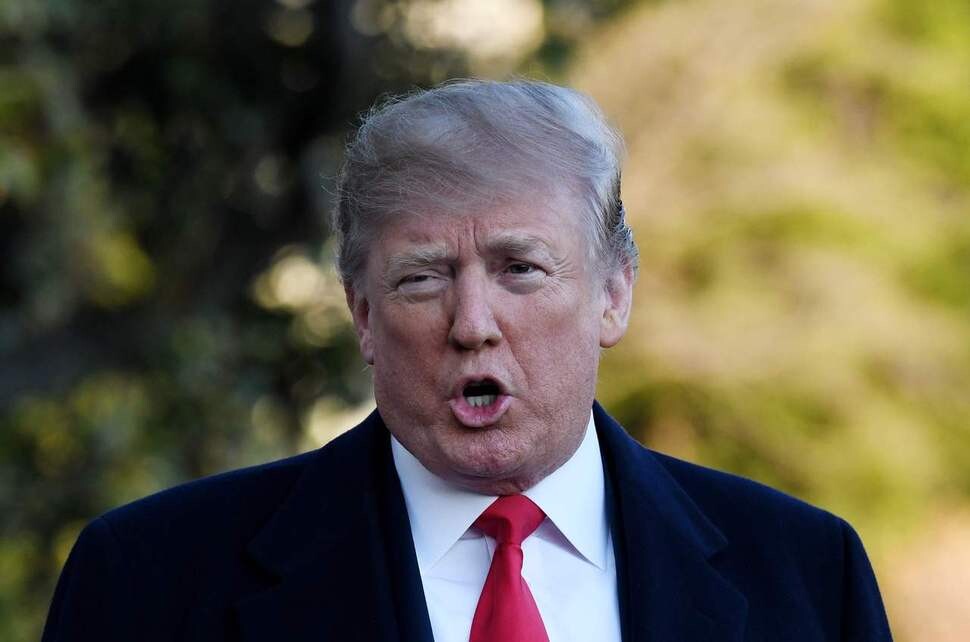hankyoreh
Links to other country sites 다른 나라 사이트 링크
[Correspondent’s Column] Trump’s decision on Iran nuclear deal could complicate summit with Kim Jong-un

The Trump administration has three major diplomatic events scheduled for May. Many are aware of Trump’s potential summit with North Korean leader Kim Jong-un. There is also the deadline for deciding whether to withdraw from the Iran nuclear deal (officially known as the Joint Comprehensive Plan of Action) on May 12. On top of this, the Trump administration will reportedly be announcing its peace plan for the Middle East in May.
“While the announcement of the Middle East peace plan might be pushed forward to April or pushed back to June because of the North Korea and Iran issues, it could happen nearly simultaneously,” said an analyst at a think tank in Washington, who asked to remain anonymous.
Because of the chronological proximity of these three major events, they are bound to have a mutual effect on each other, both directly and indirectly. None of the specifics of the Middle East peace plan have been made public. Even so, it’s clear that the Trump administration is pushing forward its own peace plan despite pushback from the Palestinians about the US’s announcement to recognize Jerusalem as the capital of Israel. Depending on the details, the plan could provoke more turmoil. This could divert attention from reaching an agreement in the North Korea-US summit or implementing that agreement.
The fate of the Iran nuclear deal is likely to have a more direct impact on the North Korea-US summit, which is set to address the issue of North Korea’s denuclearization. When Trump conditionally extended the sanctions waiver for Iran on Jan. 12, he threatened to withdraw from the Iran nuclear deal, which was reached in July 2015 under the Obama administration, unless the deal was completely renegotiated by May 12.
While Trump is pressuring Germany, the UK and France to renegotiate the Iran nuclear deal, the likely outcome is the US pulling out of the agreement. Trump is pushing for the nullification of a sunset clause that would gradually ease restrictions on Iran’s uranium enrichment and nuclear program starting in 2025, but Germany is firmly resisting that, reports say.
One unnamed think tank analyst said that one of the reasons that Trump sacked H. R. McMaster, former US National Security Advisor, was because McMaster had been unable to force Germany to renegotiate the deal. Trump’s appointment of John Bolton, former ambassador to the UN, as McMaster’s replacement, is thought to send a stern warning to Germany. If the deal is not renegotiated to Trump’s satisfaction, Bolton, who will assume his duties on Apr. 9, will move to scrap the Iran nuclear deal.
Not only the other countries who negotiated the deal but also the International Atomic Energy Agency have criticized the actions of the Trump administration on the grounds that Iran has abided by the terms of the deal. Despite that, the Trump administration is preparing to withdraw from the agreement, the Associated Press reported on Apr. 3. These preparations would include promoting the pullout as an appropriate move and discussing such matters as the scope of sanctions against Iran.
The general view in Washington is that if Trump announces that the US is withdrawing from the Iran nuclear deal, it will send a strong signal to North Korea in its subsequent summit with the US. By showing Trump’s lack of patience, it might also pressure North Korea into moving forward quickly with the negotiations and their implementation. Some analysts highlight Trump’s apparent displeasure with the sunset clause as suggesting that he will push even more rigorously for the completely dismantlement of North Korea’s nuclear program.

But others caution against overemphasizing the connections between the Iran nuclear deal and the negotiations over the North Korean nuclear program. They say that Trump only dislikes the Iran nuclear deal because it was the work of Barack Obama, and not because of some issue with its content. Another think tank analyst predicted that Trump would spin any results of negotiations with Kim as a victory.
After scrapping the Iran nuclear deal, the US could also initiate a “secondary boycott” against Iran, involving sanctions against third parties that trade with Iran. While Europe, China and Russia would resist such a move, it would put South Korea in a bind because it has to coordinate its ongoing negotiations about North Korea’s denuclearization with the US.
By Yi Yong-in, Washington correspondent
Please direct questions or comments to [english@hani.co.kr]

Editorial・opinion
![[Editorial] Does Yoon think the Korean public is wrong? [Editorial] Does Yoon think the Korean public is wrong?](https://flexible.img.hani.co.kr/flexible/normal/500/300/imgdb/original/2024/0417/8517133419684774.jpg) [Editorial] Does Yoon think the Korean public is wrong?
[Editorial] Does Yoon think the Korean public is wrong?![[Editorial] As it bolsters its alliance with US, Japan must be accountable for past [Editorial] As it bolsters its alliance with US, Japan must be accountable for past](https://flexible.img.hani.co.kr/flexible/normal/500/300/imgdb/original/2024/0417/6817133413968321.jpg) [Editorial] As it bolsters its alliance with US, Japan must be accountable for past
[Editorial] As it bolsters its alliance with US, Japan must be accountable for past- [Guest essay] Amending the Constitution is Yoon’s key to leaving office in public’s good graces
- [Editorial] 10 years on, lessons of Sewol tragedy must never be forgotten
- [Column] A death blow to Korea’s prosecutor politics
- [Correspondent’s column] The US and the end of Japanese pacifism
- [Guest essay] How Korea turned its trainee doctors into monsters
- [Guest essay] As someone who helped forge Seoul-Moscow ties, their status today troubles me
- [Editorial] Koreans sent a loud and clear message to Yoon
- [Column] In Korea’s midterm elections, it’s time for accountability
Most viewed articles
- 1[Column] The clock is ticking for Korea’s first lady
- 2[News analysis] After elections, prosecutorial reform will likely make legislative agenda
- 3Samsung barricades office as unionized workers strike for better conditions
- 4S. Korea, Japan reaffirm commitment to strengthening trilateral ties with US
- 5[Editorial] When the choice is kids or career, Korea will never overcome birth rate woes
- 6Why Israel isn’t hitting Iran with immediate retaliation
- 7Korea, Japan jointly vow response to FX volatility as currencies tumble
- 8[Editorial] Does Yoon think the Korean public is wrong?
- 9Strong dollar isn’t all that’s pushing won exchange rate into to 1,400 range
- 10[Guest essay] How Korea turned its trainee doctors into monsters